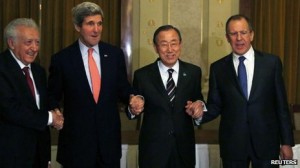 Gathering expectation: (L-R) Lakhdar Brahimi, John Kerry, Ban Ki-moon and Sergei Lavrov in Montreux[/caption]
Gathering expectation: (L-R) Lakhdar Brahimi, John Kerry, Ban Ki-moon and Sergei Lavrov in Montreux[/caption]UNITED NATIONS (AP) -- Ban Ki-moon made a rare effort at solo diplomacy when he invited Iran to join this week's Syria peace talks, but it backfired, raising questions about the effectiveness of a U.N. secretary-general better known - and often criticized - for his reserved and scripted style.
No one has said publicly what was said during Ban's intense weekend of negotiations with Iran's foreign minister, but�Ban's spokesman, Farhan Haq, said the secretary-general had an "oral understanding" with Iran and believed that a "more concrete," written understanding would follow on the terms of its attendance at the peace talks.
Ban told reporters on Wednesday, "Unfortunately, I was not able to get the firm confirmation from the Iranian government at the last minute."
Iran instead declared that it would attend only without preconditions. The whirlwind 24 hours ended up angering all sides, including the United States and Russia, and jeopardized the fragile talks when Syria's opposition threatened to drop out. On Monday, Ban withdrew the invitation.
"Certainly he was misled," a Security Council diplomat said.
Though Ban's office has said he kept the U.S. and other key states informed throughout his talks with Iran, the blame has fallen on him.
The secretary-general's bad week continued Wednesday when the tense talks began in Montreux, Switzerland. Ban repeatedly asked Syria's foreign minister to step away from the podium when he exceeded his time limit.
"You live in New York. I live in Syria," Walid al-Moallem snapped, ignoring the U.N. chief's appeal.
Well into his second five-year term as the world's top diplomat, Ban has ended up looking "a bit naive," said Stewart Patrick, a senior fellow at the Council on Foreign Relations and an expert on the United Nations.
"In this particular incident (with Iran), he miscalculated. But perhaps he miscalculated his powers of persuasion, which didn't seem too strong to begin with," Patrick said.
Changing Iran's stance "is beyond the power of any one individual who, as some wits have said, is more secretary and less general," he said.
This isn't the first time that Ban, a career diplomat from South Korea, has been in the harsh spotlight since taking his current post in 2007. Two leaked memos since then have taken sharp aim at his skills, with Norwegian diplomat Mona Juul writing in 2009 that Ban "seems to function quite well when he sticks to a script" but has problems when he is "on his own."
A year later, a memo by the outgoing under-secretary-general for oversight, Inga-Britt Ahlenius, said the organization Ban leads "is in a process of decay" and "drifting into irrelevance."
Ban, whose approach has been described as "quiet diplomacy," came into the job well aware of how he would likely be seen by the international community, especially following the more charismatic Kofi Annan.
"Sometimes I may look like a soft, weak leadership," Ban told The Associated Press shortly before becoming secretary-general. "You may look at me as a soft person, but I have inner strength."
How he has grown into the job since then is the question as he tries to nudge Syria's bloody conflict toward peace.
The Iran incident "called into question Ban's dexterity as a secretary-general in handling delicate negotiations at a major level, especially given the fact that he has been in office over seven or so years, and presumably had learned most of the tricks of the diplomatic trade by then," said Stephen Schlesinger, a fellow at The Century Foundation and a former U.N. employee.
Schlesinger said he was puzzled why Ban would take it upon himself to bring Iran to the talks.
"Such an initiative is totally out of character for Ban Ki-moon," said Thomas Weiss, a political science professor and former director of the United Nations Intellectual History Project. Ban "is not someone who leads," he said.
"Perhaps the Iranians double-crossed him?" Weiss asked.
But observers made clear that if this week's peace talks fail, there will be plenty of reasons why, and Ban cannot be blamed for that. There is only so much he can do when the Security Council's five powerful permanent members are divided, as Russia and the United States are on Syria, Patrick said.
"What it illustrates is the difficult position the secretary-general routinely finds himself in," Patrick said. "He has aspirations and is given the charge of mediating conflicts. But when issues come before the Security Council, his leash is rather short."
A rare high-profile success came last year when the Security Council voted unanimously in a major diplomatic breakthrough to secure and destroy Syria's chemical weapons stockpile. Ban, who had defended the work of U.N. chemical inspectors there, called it "the first hopeful news on Syria in a long time."
In his failed weekend talks with Iran, he appeared to be pursuing more.
Schlesinger said this week's events do not derail what the secretary-general, or the United Nations itself, is trying to achieve.
"As a historian, I have seen so often that the U.N. in so many different crises is written off as superfluous, ineffective, a waste of money - and yet it continues to bounce back because there is no other global body like it that can handle or intervene in international crises," he said.
And Haq defended Ban, describing his boss as methodical and patient in building support and saying the secretary-general ultimately will be tested not on a single day but on how the peace talks go.
"If we can achieve our goal, the messiness of getting from point A to point B fades into the background," Haq said.
And Ban declared after the first day of the peace talks ended Wednesday: "I believe I have taken the right decision, even at the last minute."
By The Associated Press
The Iran Project is not responsible for the content of quoted articles.










